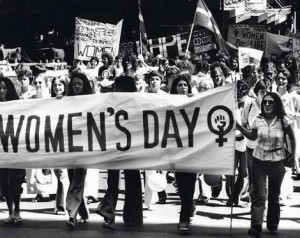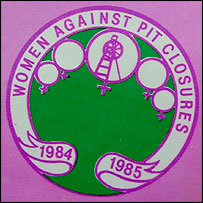Film review: A Woman’s Place
Article published: Tuesday, September 7th 2010
A screening of three diverse films from the past 40 years of the Women’s Liberation Movement, organised by Manchester Film Co-operative at the King’s Arms pub, showed what films can tell us about our history, and what we can learn from them today. Natalie Bradbury reviews.

Films, especially documentaries, offer a different way of learning about history. They can take us beyond dusty textbooks and offer a peek behind the scenes of an event — we actually get to see history in the making and share in the hopes and fears, experiences and emotions of those creating it. As Bernadette Hyland from the Working Class Movement Library in Salford explained: “This is history told by ordinary people.”
In the late 1960s, a student in Oxford piped up during a cultural history workshop and asked why they didn’t study events to do with women. She was told that if she wanted to learn about women, she would have to organise her own event. And she did. The inspirational young woman was Sheila Rowbotham, now an eminent academic, and the event she helped to organise was the first National Women’s Liberation Conference at Ruskin College, Oxford in 1970. The experiences of the conference were captured in a twenty minute film called A Women’s Place, one of those screened at the King’s Arms.
The wide-eyed, excited faces of the hundreds of women who descended on Oxford for the National Women’s Liberation Conference shines though the blurriness of the video. We sense the hope and excitement they felt at being surrounded by other women who shared the same concerns as them, as they debate issues about men’s, women’s and children’s liberation. “Women are talking again after there’s been silence for so many years”, says one in a memorable speech.
As the narrator of A Woman’s Place admits however the event is very insular: the gathering of educated, eloquent young women contrasts starkly with vox pops of women on the street outside, who appear oblivious both to the fact that the conference is taking place but also that as women that they might face any particular problems in society.
Yet the crossing of the gulf between ivory tower and popular action that marked the early new feminist movement is seen later on, with the sequence of a march in London “to let the public know who we are and what we stand for”. Women, men and children march in support of the four objectives set out at the conference: equal pay, equal access to education and opportunity, 24 hour childcare and free access to contraception and abortion. What may today sound like reasonable demands were at the time at the heart of a radical agenda, which aimed not only at the acquisition of rights but far-reaching social transformation: in our roles and relationships with one another.
 Another film shows a starkly contrasting side of the women’s movement. Produced by a group of miners’ wives in Derbyshire during the struggle of 1984-5, it demonstrates the power of film to reach out to people across the country at a time when Thatcher used the media to control public opinion of the strikers. The miners’ wives are angry and defiant, filming their experience as a way of showing the hardship faced by ordinary families, as well as the absurdity of the scale of the police reaction to the strikes. A murmur of recognition passes around the crowd watching, decades on, from those who were there and can remember.
Another film shows a starkly contrasting side of the women’s movement. Produced by a group of miners’ wives in Derbyshire during the struggle of 1984-5, it demonstrates the power of film to reach out to people across the country at a time when Thatcher used the media to control public opinion of the strikers. The miners’ wives are angry and defiant, filming their experience as a way of showing the hardship faced by ordinary families, as well as the absurdity of the scale of the police reaction to the strikes. A murmur of recognition passes around the crowd watching, decades on, from those who were there and can remember.
By the 1980s, the women’s movement encompassed broader aims, such as solidarity with Northern Ireland, and lesbian and black rights. A film about International Women’s Day is an all singing, all dancing celebration of diverse groups of women coming together.
These films show not only the attitudes of the time, but how far we have come — and how far we have left to go. In a discussion afterwards, one woman claims: “We’re going backwards, people think we’ve won.” But, as members of the recently formed Manchester Feminist Network explain, there are new issues to fight against now — the objectification of women, eco-feminism, female genital mutilation, pornography.
The women’s movement is far from being silenced however, with women still mobilising today to hold events like Reclaim the Night and Million Women Rise — today’s events, tomorrow’s history.
Natalie Bradbury
Manchester Film Co-operative organises monthly showings of films that challenge current economic, social and political arrangements and offer alternatives, with a focus on independent films that are not available in mainstream cinema.
For more information, visit their website: http://www.manchesterfilm.coop/
More: Culture, Manchester, Screen
Comments
No comments found
The comments are closed.



